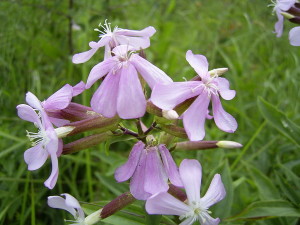Saponaria officinalis is a common perennial plant from the carnation family (Caryophyllaceae). This plant has many common names, including common soapwort, bouncing-bet, crow soap, wild sweet William, and soapweed. There are about 20 species of soapworts altogether.
Contents
Uses
External use:
As its common name implies, it can be used as a very gentle soap, usually in dilute solution. It has historically been used to clean delicate or unique textiles; it has been hypothesized that the plant was used to treat the Shroud of Turin.
A lathery liquid that has the ability to dissolve fats or grease can be procured by boiling the leaves or roots in water. Take a large handful of leaves, bruise and chop them and boil for 30 minutes in 1 pint/600ml of water; strain off the liquid and use this as you would washing-up liquid.
In the Romanian village of Sieu-Odorhei, natives call the plant “Sǎpunele”. It is traditionally used by the villagers as a soap replacement for dry skin.
Internal use:
Despite its toxic potential, Saponaria officinalis finds culinary use as an emulsifier in the commercial preparation of tahinihalva, and in brewing to create beer with a good “head”. In India, the rhizome is used as a galactagogue.
In the Middle East, the root is often used as an additive in the process of making the popular sweet, halvah. The plant is called ‘erq al halaweh in Arabic, çöven in Turkish, and is utilized to stabilize the oils in the mixture or to create a distinctive texture of halvah.
Benefits
Although soapwort has multiple therapeutic benefits, it is primarily taken internally as an expectorant or a remedy for coughs. It is believed that the herb’s function as a potent irritant in the alimentary canal or gut invigorates the cough reaction and induces the secretion of more liquid mucus inside the respiratory tract. As a result of this property of soapwort, the herbal medical practitioners recommend the use of the aromatic plant to cure bronchitis, coughs and even some conditions of asthma (a respiratory disease caused by allergies). The herb has other therapeutic advantages too and is used to treat rheumatic and arthritic pain. Decoctions prepared with the roots of the herb are effective in treating skin conditions such as eczema and itchiness. Even infusions prepared with the soapwort parts above the ground helps in washing the skin and bringing relief from irritations.
The entire soapwort plant, barring the root, possesses alternative, gentle diuretic, diaphoretic, chalogogue, antiscrophulatic, and depurative, expectorant, tonic, laxative as well as sternutatory properties. A decoction prepared using the entire plant may be applied topically for treating skin itchiness. In addition, it has been proved that soapwort is effective for treating jaundice as well as other different visceral obstructions. However, in contemporary herbal medicine, this plant is seldom used internally because it causes irritation to the digestive system.
Excessive use of soapwort not only devastates the red blood cells (erythrocytes), but also paralyzes the vasomotor center. The root of soapwort is unearthed during spring and may be dried up and stored for future use. One saponin present in the soapwort plant has generated a lot of interest in cancer treatment – in laboratory tests (in vitro) it has been found that this saponin is cytotoxic to a form of cancer called Walker Carcinoma. Soapwort has been granted the German Commission E Monograph, a remedial guide to herbal remedies, indication for bronchitis and coughs.
Caution
An overdose can cause nausea, diarrhoea and vomiting.
Interactions
None are recorded.
Other names
Bouncing-Bet, Herbe à Foulon, Herbe à Savon, Jabonera Roja, Saponaire, Saponaire Commune, Saponaire Officinale, Saponaire Rouge, Saponaria officinalis, Saponariae Rubrae Radix, Savonniè re, Soapwort
Reference
Source: Wikipedia, https://en.wikipedia.org/wiki/Saponaria_officinalis
Herbs2000, http://www.herbs2000.com/herbs/herbs_soapwort.htm

